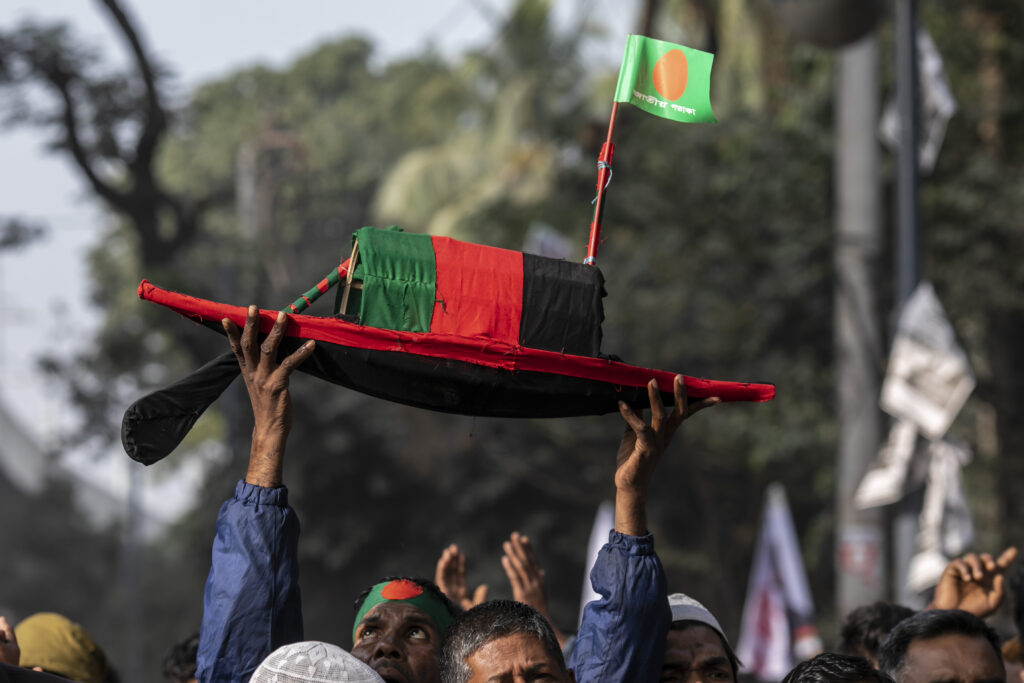In 2024, Bangladesh has seen the emergence of a so-called ‘India Out’ boycott movement. This campaign, kicked off by allegations of Indian interference in Bangladesh’s national parliamentary elections on 7 January 2024, gained momentum domestically and internationally. It urges Bangladeshis to choose local products over Indian imports.
Resentment toward India intensified following the incumbent Awami League’s fourth successive win in the controversial 2024 elections. The election was characterised by a low voter turnout, an opposition boycott and the presence of ‘dummy candidates’—ostensible independents supported by the ruling party to simulate competition.
Bilateral relations between India and Bangladesh were not always so tense. Indian support during Bangladesh’s Independence War in 1971 against Pakistan was significant, but there have also been intermittent tensions stemming from issues ranging from the treatment of minority communities and irregular migrants to trade imbalances and intense cricket rivalries.
The Bangladesh–India border, another source of tension, is one of the deadliest in the world. Between 2000 and 2021, approximately 1253 Bangladeshis lost their lives and 1157 sustained injuries due to incidents involving the Indian border security forces.
As like 2024, the main opposition parties boycotted the 2014 elections in protest against the Awami League’s decision to rescind the practice of appointing a non-partisan caretaker government ahead of elections. The opposition’s boycott marked a watershed moment in contemporary Bangladeshi politics, which has been marked by a decade-long process of democratic backsliding under Prime Minister Sheikh Hasina.
When all domestic and international actors, except the incumbent Awami League, sought an agreement on the 2014 election process, Indian Foreign Secretary Sujatha Singh visited Bangladesh and pressured the opposition Jatiya Party (JP) to desist from boycotting the elections. JP’s reluctant participation provided much-needed opposition and a degree of legitimacy to the election.
In the 2018 elections, the incumbent Awami League assured a ‘fair’ electoral process, which saw the participation of opposition parties. Yet, the elections were marred by reports of intimidation, arrests, torture, enforced disappearances and assaults on opposition figures. Some government critics have made claims that an Indian intelligence agency played a role in aiding election manipulation strategies in 2018.
Similar suspicions of Indian interference became an issue in 2024’s election. The opposition’s massive street mobilisation demanding the reinstatement of the caretaker government system, followed by Western pressure to uphold democracy and human rights—including US visa restrictions for those it said had undermined democracy in Bangladesh—put the Awami League regime under pressure.
According to Indian media reports, Indian policymakers were unhappy with Washington’s position, claiming it would destabilise Sheikh Hasina’s regime and be detrimental to the security of India and South Asia. India, according to the Awami League’s General Secretary Obaidul Quader, therefore engaged in an ‘underhand negotiation’ between the United States and Bangladesh to dodge US sanctions. Quader commented after the election that ‘when the Bangladesh National Party tried to foil the national election with the help of another country, India stood beside Bangladesh and behaved like a good neighbour’.
Regarding India’s role in the last three rigged elections, Foreign Minister Hasan Mahmud said that there were ‘conspiracies’ in the 2014 and 2018 elections, but that India was on Bangladesh’s side. A candidate in the 2024 election remarked that, ‘I am the candidate of Sheikh Hasina, I am the candidate of India.’
Influencing foreign countries’ elections is always a covert business, especially if foreign intelligence agencies are involved. But the open discussion of alleged Indian interference in Bangladesh by political leaders, commentators and journalists in Bangladesh and India media have triggered a virulent anti-Indian backlash in Bangladesh.
The ‘India Out’ campaign started brewing on social media platforms. Many leaders and activists from the main opposition party, the Bangladesh Nationalist Party, embraced it wholeheartedly, but the party has not endorsed it officially. Despite this, as an AFP fact checker found, more than 10 Indian media outlets claimed that the opposition launched the boycott movement.
An analysis of the ‘India Out’ campaign reveals that the boycott has been portrayed as an initiative of radical Islamists or the pro-Pakistan and anti-Indian BNP.
Indian commentators and policymakers believe the boycott in Bangladesh was inspired by a similar movement in the Maldives, which they suspect enjoyed the patronage of China. These speculations miss a crucial factor — the people of Bangladesh who have been deprived of their voting rights in the last three elections.
The campaign gained traction among the youth, social media activists, civil society and leftist political parties. In contrast, influential Islamist parties have remained silent about ‘India Out’. One conservative Islamist group, Bangladesh Islami Front, has completely rejected the campaign.
India’s unqualified support for a government holding power without a proper mandate and geopolitical issues likely fuel the resentment. Portraying it as a movement of only radical Islamists fails to address the root of the crisis. This approach will further worsen the bilateral relations between India and Bangladesh.
Many question the prospects of the burgeoning anti-India campaign, given the dependency of Bangladesh on Indian imports — totalling more than US$16 billion in 2022. Boycotting Indian products will impact the availability and price of essential items, as well as the health and tourism sectors.
Bangladesh only constitutes around 3.5 per cent of the Indian export market. An effective boycott of Indian consumer products and tourism could boost Bangladesh’s domestic tourism, entertainment and consumer product sectors.
The main implication of this campaign is therefore not economic, but political. The ‘India Out’ campaign has achieved its aims in having clearly transmitted a message of growing anti-India sentiment in Bangladesh in both India and around the world.
Saimum Parvez is a Marie Curie Postdoctoral Research Fellow at Vrije Universiteit Brussels, Belgium.

